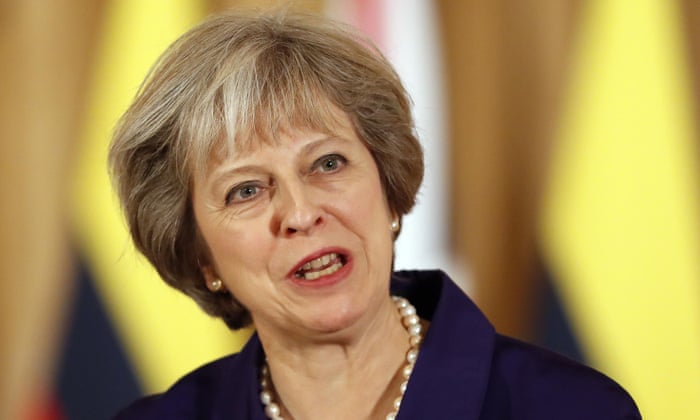A Brief Colonial History Of Ceylon(SriLanka)
Sri Lanka: One Island Two Nations
A Brief Colonial History Of Ceylon(SriLanka)
Sri Lanka: One Island Two Nations
(Full Story)
Search This Blog
Back to 500BC.
==========================
Thiranjala Weerasinghe sj.- One Island Two Nations
?????????????????????????????????????????????????Friday, November 4, 2016
Court ruling means act of parliament would be needed for Brexit, says May
PM
says logical conclusion of decision is that legislation would be
required to trigger article 50, but government plans to appeal

Theresa May will reassure EU
figures that the government aims to stick to the timetable set out at
the European council. Photograph: Kirsty Wigglesworth/AP
 Theresa
May has said she accepts that the “logical conclusion” of the high
court judgment on Brexit is that the government would have to pass an
act of parliament before it could trigger article 50, the formal process
for leaving the European Union.
Theresa
May has said she accepts that the “logical conclusion” of the high
court judgment on Brexit is that the government would have to pass an
act of parliament before it could trigger article 50, the formal process
for leaving the European Union.
The government has said it will appeal against Thursday’s unexpected
high court ruling, which stated that MPs needed to vote on triggering
article 50. Downing Street has insisted it will stick to the timetable of invoking article 50 before the end of March 2017.
Asked whether the prime minister agreed with the Brexit secretary, David
Davis, that if the judgment is upheld by the supreme court next month
the government will have to put a bill before parliament, she said:
“What David Davis was setting out is what would be a logical conclusion
to draw from the judgment from today.”
Davis had said: “The judges have laid out what we can’t do and not
exactly what we can do, but we are presuming it requires an act of
parliament, therefore both Commons and Lords.”
A formal bill would grant MPs and peers the opportunity to stage a full
debate before article 50 is triggered; to table amendments and, some
hope, debate the broad principles on which the government will conduct
negotiations with the other 27 EU member states.
May has requested a phone call with the European commission president,
Jean-Claude Juncker, on Friday morning, in which she will reassure him
that the government is continuing with its plans and sticking to the
timetable set out at the European council. She is also expected to seek
to reassure other key EU figures, including the council president,
Donald Tusk.
Some in Westminster believe the high court decision has made the
prospect of an early general election more likely by increasing the risk
that the prime minister will be unable to manage the tensions within
her own party.
Dominic Raab, the Tory MP and former minister, said: “If we get to the
stage where effectively [some MPs] are not willing to allow this
negotiation to even begin, I think there must be an increased chance
that we must go to the country again. I think that would be a mistake
and I don’t think those trying to break the verdict of the referendum
would be rewarded.”
May’s spokeswoman insisted: “Our position has been clear that there
should not be an election before 2020; that remains the prime minister’s
view.”
Pro-remain MPs hope they can use the opportunity for parliamentary
scrutiny created by the ruling to argue against a hard Brexit, where the
UK would give up membership of the single market, as well as the
customs union that allows free circulation of goods. It also gave
further hope to the Scottish government of getting a greater say in the
Brexit negotiations.
No 10 attempted to play down the significance of the ruling, insisting
that the plan for Brexit remained on track. “The prime minister is clear
and determined that this government will deliver on the decision of the
British people and take us out of the EU. We are determined to continue
with our plan, preparing for negotiations and sticking to the timetable
we set out,” it said.
Victorious Gina Miller reacts to article 50 ruling: ‘this case was about process, not politics’ – video
Victorious Gina Miller reacts to article 50 ruling: ‘this case was about process, not politics’ – video
“We have no intention of letting this decision derail our timetable for triggering article 50.”
Government lawyers argued that prerogative powers were a legitimate way
to give effect “to the will of the people”, who voted by a clear
majority to leave the European Union in the June referendum. But
the lord chief justice declared: “The government does not have power
under the crown’s prerogative to give notice pursuant to article 50 for
the UK to withdraw from the European Union.”
May’s spokeswoman said the prime minister was working from Downing
Street as usual and would not be making any public statement on Thursday
about the government’s defeat in court.
May will send a cabinet minister to the House of Commons on Monday to
make a statement about the ruling, but she will not attend because she
will be on a trade trip to India.
Nicky Morgan, the former education secretary, said she believed
colleagues on all sides of the Commons would vote in favour of
triggering article 50, but said “democracy has been asserted”.
“I am also very confident in colleagues in parliament; we are very aware
of how people voted – 17 million – to leave the EU. I expect parliament
will approve the triggering of the article 50 process. It’s a question
of law.”
The Labour leader, Jeremy Corbyn, said: “This ruling underlines the need
for the government to bring its negotiating terms to parliament without
delay. Labour respects the decision of the British people to leave the
European Union. But there must be transparency and accountability to
parliament on the terms of Brexit.”
